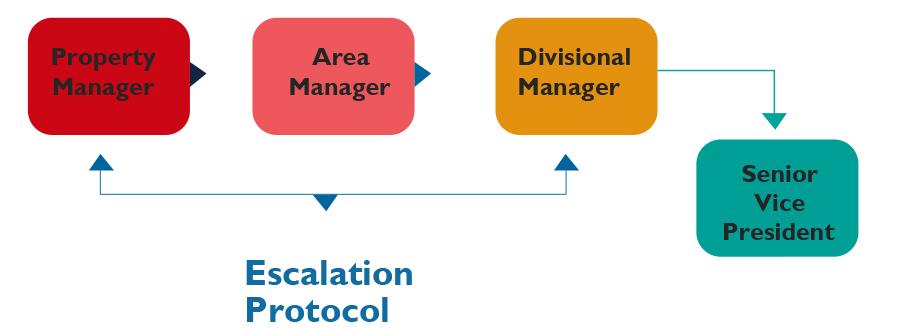

CRISIS QUICK GUIDE

This crisis guide, in conjunction with the Windsor Communities Crisis Plan, is designed to serve as a guide for Windsor associates so they are prepared to assist in responding to a crisis/emergency while minimizing disruption to ongoing operations.
IN THE EVENT OF A CRISIS,
please make sure that you and others are safely out of harm’s way before addressing the communications needs of a situation. The safety of our associates and residents is the top priority.
Crisis Tiers

A Minor Crisis is a localized issue that can be resolved with minimal guidance. PM Lead assumes responsibility for the issue and follows normal notification procedures.
Resident communication may or may not be needed.
• In the event of a property wide power outage, contact Yardi Call Center to alert residents that “_________” utility company is aware and working on the problem.
Examples include:
• Building system issues, such as power outages, water leaks, elevator entrapments, etc. Extreme weather events
• Singular incidents of theft, vandalism, and other low-level crime events
• Common resident issues, such as eviction, noise complaint, etc.
• Medical emergency or infectious disease transmission
Tier 1 - Minor Tier 2 - Moderate
A Moderate Crisis is a single or recurring incident that may disrupt normal operations or may have potential to develop into a Major Crisis. PM Lead alerts DM and seeks guidance from the Crisis Communications Team (CCT).
Examples include:
• Multiple incidents of theft, vandalism, and other patterns of crime
• Singular incident of violent crime
• Boycotts, protests, or other organized disputes
• Resident complaints to the media or on social media
Tier 3 - Major
A Major Crisis is an extreme incident that may seriously impact normal operations, as well as the Windsor brand or reputation and may draw immediate media attention. PM Lead prioritizes present threats to life safety and property damage, notifies SVP and the Crisis Communications Team (CCT) at the earliest possible time.
All communications must be approved by Crisis Communications Team.
Examples include:
• Threats of violence or harm, such as a bomb threat or terrorist threat Active shooter
• Incidents of violent resident death or sexual assault
• Incidents of disaster including extreme weather events (hurricane, tornado, snowstorm, earthquake), fire, or gas leak
• An incident that would potentially threaten the Windsor/GID brand, such as discrimination accusation, sexual harassment, embezzlement, etc.
Steps to take for Tier 2 & Tier 3 Crises
IMMEDIATELY
STEP 1
• Prioritize the situation and, to the best of your ability, safely contain or manage the crisis based on operational protocols and procedures.
• Ensure that calls have been made to appropriate emergency responders. Coordinate and cooperate with emergency responders.
• If it is an operational situation (water main break, electrical outage, gas leak, etc.) take the necessary steps to notify the correct party and rectify the situation.
• For a Tier 3 crisis only: Trigger emergency SMS/email to residents if necessary.
• Gather facts and contact information of those involved and investigating (residents, law enforcement, etc.)
• It is essential to have all the facts of the situation for the Crisis Communications Team and Executive Leadership. Critical incident information includes: What happened? How did it happen? When did it happen? Were there any injuries? What is the extent of the damage? Is there any current or ongoing danger? Is business disrupted? Is there a public health/community impact? Have there been any resident inquiries about the situation? How could the situation evolve and what can be done to keep it from getting worse?
• Take pictures of the incident in preparation for documenting the incident for insurance, if applicable.
STEP 2 Call your Divisional Manager to report the incident, share information to date, and determine the level of crisis.
STEP 3 In a Minor or Moderate Crisis situation, determine the most affected audience (residents, employees, general public, community leaders, etc.) and work with Divisional Manager on distributing pre-approved communications tools (emails to residents, social media response, etc.)
STEP 4 Determine whether any emails or holding statements in the message bank are appropriate to send to residents.
• If not, or if the situation has the potential to prompt significant and sustained news coverage, public scrutiny or resident complaints or has the potential to damage the reputation of the community or GID/Windsor, immediately elevate to a member of the crisis team (crisis team listed on page 4).
STEP 5
• Communicate action plan and current status to those involved (HR, Marketing, Leadership, Operations, Legal, PR, Social Media, etc.)
• Advise In-House and/or 3rd Party Concierge Lead to respond to resident inquiries by saying: "The team is in the process of working on or with and I have no information at this time to share."
• Review all planned communication (social media, eblasts, etc.) and pause as appropriate.
STEP 6 Monitor situation with residents, community, press and social media, and share with team to determine next steps until the crisis is resolved.
STEP 7 Provide any follow up details to HR, Marketing, Leadership, and Operations.


Communications & Notifications
Crisis Team
In the event of a crisis, please contact one of the following people in the prioritized order below. Please call or text before sending an email to ensure an immediate response.
• Greg Harris, Weinberg Harris & Associates - Primary Agency Contact
- (410) 493-6757, gharris@weinbergharris.com
• Mary Miles, Weinberg Harris & Associates - Secondary Agency Contact
- (443) 614-8013, mmiles@weinbergharris.com
• Christi Samuelian, GID – SVP, Sales & Marketing
- (617) 816-8656, csamuelian@windsorcommunities.com
Modes of Communication – to be determined app
Channels may be used to communicate with residents during a crisis could be:
• Minor: Resident emails, message on resident portal, text message via Yardi, social media, signage, door-to-door communication as appropriate
• Moderate: Resident emails, message on resident portal, text message via Yardi, speaking points, social media (under guidance from the Crisis Communications team)
• Major: Utilize pre-approved communication for Emergency SMS or email through Yardi, as available; follow up approved communication tools provided by the Crisis Communications team (speaking points, resident emails, social media copy)
MEDIA
No media are allowed on property at any time. If media attempt to enter the community or interview employees, staff, or residents, they should be politely escorted off property. Inform the crisis team of any media on site.
Politely decline the opportunity by saying, “I cannot participate in any interviews. Please give me your contact information, I will forward it to our Corporate Communications team who will be in touch with you. Because X Community is located on private property, I must ask you to leave at this time.”
Should you receive questions or inquiries via phone from reporters, editors, or other members the media, please send the request to the crisis team who will then manage the response.
SOCIAL
MEDIA
Pause email blasts and scheduled social media posts and evaluate social media plans for the next few days and week. Each post, campaign or ad will require an added layer of care and empathy.

